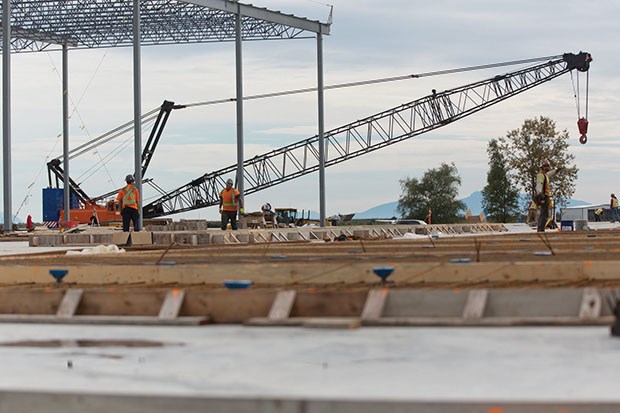The region is facing a crisis with a shrinking supply of much-needed industrial land, according to property developer Ron Emerson.
In a recent interview with the Optimist, Emerson said industry in the Lower Mainland is getting pushed out, a common problem seen in around the world where cities grow.
"The underlining factor in Vancouver is that the amount, maybe 50 per cent but maybe higher, of the existing industrial inventory is functionally obsolete. Even on Annacis Island, and I did a lot of work there in the '80s and '90s, a lot of those buildings are too small," he said.
The Emerson Real Estate Group was recently thrust into the spotlight once again after Delta South MLA Vicki Huntington revealed most of the much talked about option-to-purchase agreements for ALR properties in South Delta have been extended for another year.
Huntington said most of the original options were set to expire on Nov. 30, but farm owners and Emerson extended all but two. The total amount of known optioned land near Deltaport Way has been reduced to 236 hectares (591 acres) from 296 hectares (739 acres). Huntington's original revelation about the option deals last year made headlines, intensifying the debate about the future of farmland in Delta. It's a debate that's growing with port expansion and a provincial ALR review now underway.
Adding to those concerns is South Fraser Perimeter Road, now partially open and seen as a potential catalyst for industrial development, as well as a bridge to replace the aging George Massey Tunnel.
Emerson Real Estate Group, representing an industrial consortium, had a proposal to convert farmland into an intermodal rail yard with warehouse distribution, although an application has yet to be submitted to the Agricultural Land Commission.
Emerson questions farmland advocates' claims the lands in question are "prime agricultural lands" and says what's been painfully lacking in the region is an open discussion when it comes to land use, job growth and the economy.
He argues there are parcels within the Agricultural Land Reserve that are not in use or of poor quality that could help solve some of the industrial shortage.
"The Agricultural Land Reserve is sort of sacred ground and you can't talk about it, but we need to have a real discussion about it because the industry in
Vancouver, and there was a lot even when I came to town, it's all gone. It has to go somewhere. If you want jobs, and a place like Vancouver has absolutely screwed itself, there's no more room for any commerce.
"Our market is quite different than Seattle, different than Portland and Toronto in the sense that we don't have these big, large uses, but we are a port city. This is a gateway to Canada."
It's a view echoed by Port Metro Vancouver CEO Robin Silvester. In an interview last year, Silvester said a discussion is needed regarding long-term land uses, otherwise the region's economy faces serious consequences.
Noting business and jobs are already being lost to Alberta, Emerson said land being converted to residential and smaller commercial, high land costs, traffic congestion and high taxes have all contributed to the squeeze, a problem made more difficult when there's nowhere to go.
"I think we are blessed to have the port because it will create a lot of jobs. There will be even more if land is available," he said.
Paul Tilbury, COO of the Dayhu Group of Companies, the firm behind the Boundary Bay Industrial Park now under construction, also recently told the Optimist there's a lack of space for larger scale logistics centres in the region.



